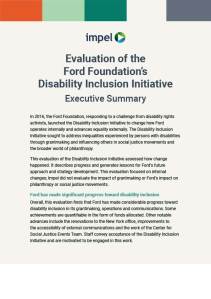Evaluation of Ford’s Disability Inclusion Initiative
The Challenge
Disability intersects with every issue, because disabled people exist in every community. Yet for far too long, few social justice or human rights donors have seen dismantling ableism as key to achieving equity. Disability can no longer be an afterthought in grantmaking circles.
Beginning in 2016, our President, Darren Walker, acknowledged that our mission to fight inequality in all its forms cannot be done without the explicit inclusion of people with disabilities and he committed to incorporating a disability lens across all our grantmaking. We set out to tackle three problems – our programs had not historically addressed disability, our staff lacked technical capacity and lived experience, and our operations were not fully inclusive or accessible.
What We Did
Over the past six years, our strategy has focused on transforming our operations and grantmaking to center people with disabilities in our work.Since 2018, we have invested more than $70 million toward projects and organizations focused on disability and an additional $250 million to social justice organizations including disability within their broader work. In addition to our grantmaking, we have redesigned our landmark New York City headquarters, our website, and events to be more inclusive and accessible. We have invested in anti-ableism training for our staff and refined our employment practices and policies to further recruit and support staff with disabilities.
To assess our progress, we partnered with Impel Consulting, a global disability consulting firm with deep experience assessing organizations and providing support for them to realize their commitments to disability inclusion. This evaluation focused on internal changes, not the impact of grantmaking or Ford’s impact on philanthropy and social justice movements.
What We Learned
Overall, we have made significant progress toward disability inclusion throughout our grantmaking, operations, and communications. As now one of the largest funders of disability rights globally, we are committed to holding ourselves accountable and assessing our progress along the way. Considering that commitment, we are eager to share the main findings, which can be found in the Executive Summary and our main takeaways:
1. Leverage Senior Leadership
Placing the Disability Inclusion Initiative within the Office of the President gave it visibility and credibility. Over time, senior leadership support for this work expanded throughout the organization. This signaled to staff and the broader community the importance Ford placed on disability inclusion and provided a launchpad to engage in advocacy to influence the philanthropic sector.
2. Resource Disability Commitments
Growing ambition requires more resources. Ford’s early investment in the Disability Inclusion Initiative enabled us to progress our agenda relatively quickly. Setting targets for disability grantmaking and resourcing matching funds to incentivize disability grantmaking helped Ford triple our disability grantmaking from 2018 to 2021.
3. Destigmatize Discussion About Disability
Disability trainings and diverse learning opportunities have helped normalize discussions on disability. Disability training has helped to shift mindsets, especially around the need for, and benefits of, attention to disability inclusion. While there is a need for continued training, disability has gone from an unfamiliar topic, to one that staff expect to see throughout Ford’s work.
4. Build an Inclusive Culture
A significant portion of staff identify as persons with disabilities, though creating a culture where staff with disabilities feel safe and able to share their disability identity is a process. While we have taken clear steps to provide reasonable accommodations to those who request them, more communications around the availability of those accommodations may encourage staff members who need them to access those resources.
5. Engage People with Disabilities
Knowing that good grantmaking practices involve partner-led approaches, Ford has embraced the disability movement’s mantra, “nothing about us without us.” The bedrock of an inclusive culture includes the participation of disabled people in all that we do. Alongside our efforts to hire more staff with disabilities and those with disability expertise, we’ve also established several different advisory groups of experts with disabilities.
